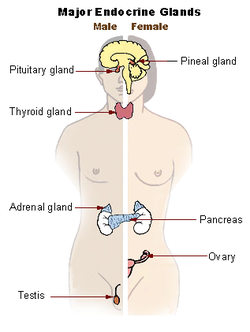THYROID GLAND
The thyroid’s main role in the endocrine system is to regulate your metabolism, which is your body’s ability to break down food and convert it to energy. Food essentially fuels our bodies, and our bodies each “burn” that fuel at different rates. This is why you often hear about some people having “fast” metabolism and others having “slow” metabolism.
The thyroid keeps your metabolism under control through the action of thyroid hormone, which it makes by extracting iodine from the blood and incorporating it into thyroid hormones. Thyroid cells are unique in that they are highly specialized to absorb and use iodine. Every other cell depends on the thyroid to manage its metabolism.

During development, the thyroid is actually located in the back of the tongue and has to migrate to the front of the neck before birth.
HORMONES
The two main hormones the thyroid produces and releases are triiodothyronine and thyroxine.The thyroid also produces calcitonin, which helps control blood calcium levels.
The thyroid's hormones regulate vital body functions, including:
- Breathing
- Heart rate
- Central and peripheral nervous systems
- Body weight
- Muscle strength
- Menstrual cycles
- Body temperature
- Cholesterol levels
MOST COMMON ILLENS
Hypothyroidism , by contrast, stems from an underproduction of thyroid hormones. Since your body's energy production requires certain amounts of thyroid hormones, a drop in hormone production leads to lower energy levels. Causes of hypothyroidism include:
- Hashimoto's thyroiditis : In this autoimmune disorder, the body attacks thyroid tissue. The tissue eventually dies and stops producing hormones.
- Removal of the thyroid gland
- Exposure to excessive amounts of iodide
- Lithium
Untreated for long periods of time, hypothyroidism can bring on a myxedema coma, a rare but potentially fatal condition that requires immediate hormone treatment.
hyperthyroidism is due to an overproduction of thyroid hormones, but the condition can occur in several ways:
- Graves' disease: The production of too much thyroid hormone.
- Toxic adenomas
- Subacute thyroiditis: Inflammation of the thyroid
- Pituitary gland malfunctions or cancerous growths in the thyroid gland
BIBLIOGAPHY:
